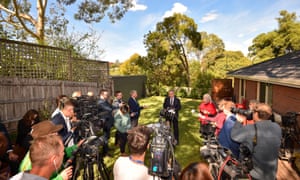- Extract from The Guardian
Scott Morrison went for solemnity as he called the 2019 election, and Bill Shorten went to the suburbs. Literally
As election campaign openings go, Thursday’s was strangely subdued.
Scott Morrison went for solemnity with his opening salvo, and Bill
Shorten went to the suburbs. Literally. The Labor leader’s campaign was
launched on a back lawn in Mitcham, with a whipper snipper, or a power
tool, or a leaf blower, or something, whirring away in the background.
Both of the leaders kept their opening statements tight, and pesky questions to a minimum. Morrison, remote and prime ministerial in his courtyard, and deliberately so to project the weight of incumbency, warned the economy would tank if he lost, and you’d get Bill Shorten if you voted Labor. Insert horrified gasp.
Shorten, down with the people, said the government was tired, and Labor was energetic, and he understood voters were angry, and sick of the soap opera, and wanted the economy to work for them.
It was election day, yet just another day. Given very little
governing has happened in the parliament finally permitted to expire on
Thursday morning; given we’ve been locked for the past three years in
the permanent campaign triggered by Malcolm Turnbull almost losing the
last election; given we’ve been imprisoned in a grinding cycle of the Coalition
sometimes fighting Labor, but mostly fighting each other – Thursday
felt much like Wednesday, to be honest. And Tuesday. And Monday.Both of the leaders kept their opening statements tight, and pesky questions to a minimum. Morrison, remote and prime ministerial in his courtyard, and deliberately so to project the weight of incumbency, warned the economy would tank if he lost, and you’d get Bill Shorten if you voted Labor. Insert horrified gasp.
Shorten, down with the people, said the government was tired, and Labor was energetic, and he understood voters were angry, and sick of the soap opera, and wanted the economy to work for them.
The key difference was both leaders were settling into their campaign selves. Morrison substituted solemn for shouty because he wanted to underscore the gravitas of the moment he wanted to sell, live on breakfast television. He wanted voters to know that they could make The Wrong Choice at this election, and that choice would have consequences.
Shorten has been settling since the start of the year into a more confident version of himself, slowing his delivery down to avoid getting tangled up in words – an affliction he’s long struggled with – simplifying the messages down to bullet points. Shorten’s campaign self would be this person, the political leader ready to go, who had grasped that less could be more.
So now we’re off for a campaign that will end with the verdict from Australians on May 18. There has been so much foregrounding with this campaign, with endless conversations about tactics occupying the vacuum where governing normally sits, I suspect most voters already know the story.
The government will try to plot a pathway to victory in Queensland, in Tasmania, in parts of New South Wales still resistant to Labor on principle. Labor, if all goes well, could win government if Victoria, the most progressive state in the country, swings significantly against the incumbents – but Labor is also eyeing gains in Queensland, where the combination of One Nation and the Palmer vote could end up being helpful, depending on where the preferences fall.
Voters also know that Labor is proposing risky policies and the Coalition will try to turn those risky policies into scare campaigns, because that’s the Coalition model for winning federal elections.
What’s unknown is what voters will make of Morrison after watching him for five weeks on the stump. Thursday morning’s opening salvo in the courtyard in Canberra borrowed heavily from John Howard, slightly from Tony Abbott, and in tone, from Robert Menzies, talking to Australians on the wireless.
It did the job, but fundamentally it was a word salad from Liberal leaders past, rather than any deep insight into the man who wants to return as prime minister on May 18, despite, well, everything. Because Morrison is tribal and imagines everyone else to be tribal, because he is always on the verge of taking offence to an imagined slight – he guards himself in a way that’s unusual for a politician.
It’s an unfortunate reflex, the defensiveness default, because Morrison actually does have some attributes to sell. The man has an insane work ethic. He can communicate with some voters at risk of rusting off. And he has also managed to keep his own riven show together sufficiently to avoid major catastrophes since taking the leadership last year, and that is no small achievement.
That’s it. It’s Morrison, or bust.

It has built a whole policy apparatus, and a campaign, on a collective instinct that offering up centre-left populism with technocratic characteristics is way to reset politics in this country. In this contest, Labor is experimenting with a formula for a social democratic party surviving the disruption battering their counterparts everywhere.
It’s a gamble, and a collective one – a positioning the post-Rudd/Gillard generation of Labor MPs owns, because it is a story they have all contributed to over the past five years.
It is the story that has held them all together.
But the open question of this election is this: has Labor called the mood correctly?

No comments:
Post a Comment